自考英语二unit
- 格式:ppt
- 大小:300.50 KB
- 文档页数:48
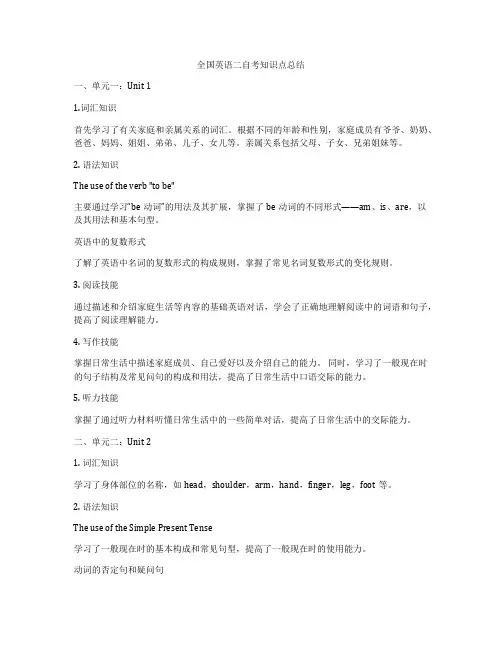
全国英语二自考知识点总结一、单元一:Unit 11.词汇知识首先学习了有关家庭和亲属关系的词汇。
根据不同的年龄和性别,家庭成员有爷爷、奶奶、爸爸、妈妈、姐姐、弟弟、儿子、女儿等。
亲属关系包括父母、子女、兄弟姐妹等。
2. 语法知识The use of the verb "to be"主要通过学习“be动词”的用法及其扩展,掌握了be动词的不同形式——am、is、are,以及其用法和基本句型。
英语中的复数形式了解了英语中名词的复数形式的构成规则,掌握了常见名词复数形式的变化规则。
3. 阅读技能通过描述和介绍家庭生活等内容的基础英语对话,学会了正确地理解阅读中的词语和句子,提高了阅读理解能力。
4. 写作技能掌握日常生活中描述家庭成员、自己爱好以及介绍自己的能力。
同时,学习了一般现在时的句子结构及常见问句的构成和用法,提高了日常生活中口语交际的能力。
5. 听力技能掌握了通过听力材料听懂日常生活中的一些简单对话,提高了日常生活中的交际能力。
二、单元二:Unit 21. 词汇知识学习了身体部位的名称,如head,shoulder,arm,hand,finger,leg,foot等。
2. 语法知识The use of the Simple Present Tense学习了一般现在时的基本构成和常见句型,提高了一般现在时的使用能力。
动词的否定句和疑问句掌握了动词的否定形式和疑问形式的基本构成和用法,提高了相关问句句型的灵活运用。
3. 阅读技能阅读理解内容主要涉及描述人体部位的基础知识,通过阅读加深了对这些知识的掌握和理解。
4. 写作技能学习了用英语如何正确描述自己的身体部位和健康状况,提高了描述自己和他人的能力,了解了一般现在时句型的使用。
5. 听力技能掌握了通过听力材料了解日常对话中关于身体部位和健康状况的内容,提高了日常交际和应对紧急情况的能力。
三、单元三:Unit 31. 词汇知识学习了有关学校生活的词汇,包括学校设施、课程安排、学习用品等。
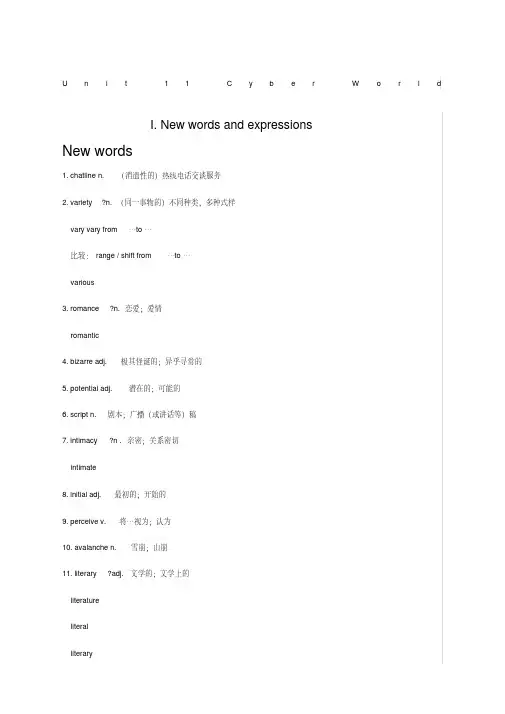
U n i t11C y b e r W o r l dI. New words and expressionsNew words1. chatline n. (消遣性的)热线电话交谈服务2. variety?n. (同一事物的)不同种类,多种式样vary vary from…to…比较:range / shift from…to…various3. romance?n. 恋爱;爱情romantic4. bizarre adj. 极其怪诞的;异乎寻常的5. potential adj. 潜在的;可能的6. script n. 剧本;广播(或讲话等)稿7. intimacy?n . 亲密;关系密切intimate8. initial adj. 最初的;开始的9. perceive v. 将…视为;认为10. avalanche n. 雪崩;山崩11. literary?adj. 文学的;文学上的literatureliteralliterateliberal12. verse n. 诗;韵文13. animated adj. 栩栩如生的;(似)能活动的14. inclination?n. 倾向;意愿inclineinclined15. sweaty adj. 满是汗的;汗津津的16. palm n. 手掌;手心17. vary v. 相异;不同18. convey v. 表达,传递(思想、感情等)19. polish v. 修改;润饰;润色20. intellect n. (尤稻高等的)智力,思维逻辑领悟力21. personality n. 性格;个性;人格22. sequence n. 顺序;次序23. reverse v. 颠倒;彻底转变;使完全相反24. veil?v. 掩饰;掩盖unveil 揭露,揭开25. intellectual adj. 智力的;脑力的;理智的26. familiarity?n. 熟悉;通晓familiarfamiliarize28. intensity?n. 强烈;紧张;剧烈intense29. stirring n. (感情、想法或发展的)开始,出现,萌发31. flesh n. (动物或人的)肉32. suspect?v. 疑有,觉得(尤指坏事可能属实或发生)33. correspondence?n. 通信;通信联系34. albeit conj. 尽管;虽然35. demon n. 恶魔;魔鬼36. determine?v. 决定determineddetermination37. extract?v. 选取;摘录;录38. addict?n. 对…入迷的人addictedaddictivebe / get addicted to sth.39. hop v. 突然快速去某处40. flirtation n. 调情41. addictive adj. 使人入迷的42. confession?n. 认罪;供认;坦白43. multiple adj. 数量多的;多种多样的44. court v. (男子向女子)求爱,追求Phrases and Expressions1. head over heels in love?深深地爱着某人;迷恋2. butterflies in the stomach?心里七上八下3. deprive…of…?剥夺;使丧失II. Text LearningCyber love①Thanks to the late 20th century technology, Maria of Denmark and Martijin of Holland meton a chatline. For months they've talked and sent letters to each other?with the help of their computers as they?found themselves falling head over heels in love. It was then that?they decided to meet in the real, not only the virtual, world. It was not easy to arrange as the young man and his lady were separated by 700 very real kilometers, but the date was a success andMaria and Martijn have been living together happily?ever since. They've created a home pageto let the world know how they've found?happiness?via?the Internet and introduce couples who've met?under similar circumstances.②Throughout history men and women had used? a variety of means?to find each other.Internet romance, according to some, is a bizarre method, and to others it is a natural wayfor?the 90's?to meet?potential mates.③Romances formed on the internet?follow a characteristic script.?The development of emotional intimacy is a long process, sometimes taking several months. "Love at?first byte" is rare although there are examples. (1)The initial light exchanges, whether by e-mail or in chatrooms, are generally followed by increasingly self-revealing topics, and then after a while, the two strangers perceive each other as a true friend.?Hearts open and an avalanche of e-mailverses and virtual gifts (flowers, kisses, animated pictures). Could any heart with romanticinclinations resist? (2)When you reach for the mouse with sweaty palms and butterflies in the stomach to look in the in-box for new mail - there's just no way to escape the fact - love has arrived.④How does a cyber romance vary from a real life romance? Perhaps one significantdifference is that communication plays such a large part. Words that convey feelings have enormous effect. (3)While before a real date we fix our hair and our clothes, on the internet we polish our intellect, imagination and personality.?(4)In essence, the sequence is reversed - first we show our inner beauty and only after it had won victory does the veil fall off the physicalvehicle of that personality at the time of that first meeting in person.⑤It is a popular topic in cyberspace to debate whether or not true love can develop merelyon an?intellectual level(智力方面,精神方面,即"精神恋爱"), without physical attraction or the?familiarity?of the other's appearance? (5)To put it another way: is the physical appearance of the man or woman play a part in the relationship if, through the exchange ofthoughts and feelings, they already fell in love?本部分重点及难点:1. The initial light exchanges, whether by e-mail or in chat rooms, are generally followed byincreasingly?self-revealing topics, and then after a while, the two strangers perceive eachother as a true friend.不管是通过电子邮件还是聊天室,最初是简单的交流,然后是越来越多自我表露的话题,过了一段时间之后,两个陌生人把彼此当成了真正的朋友。
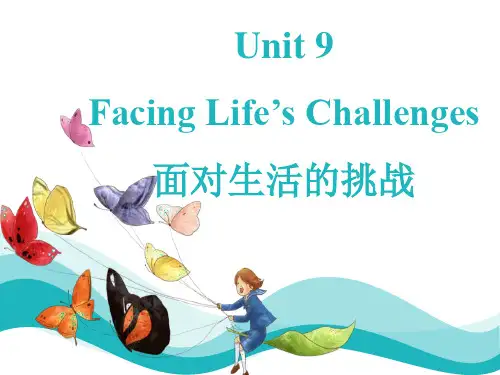
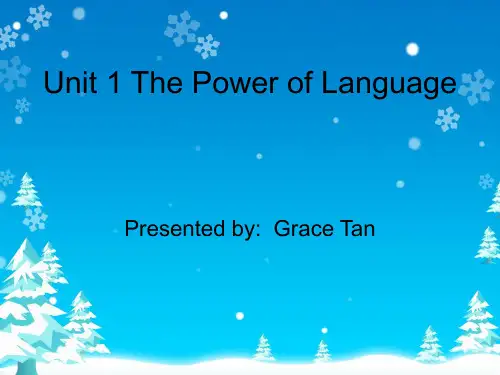

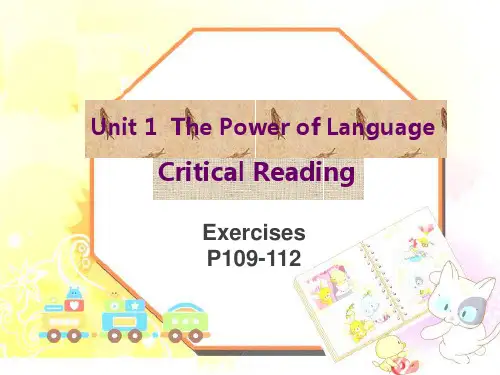
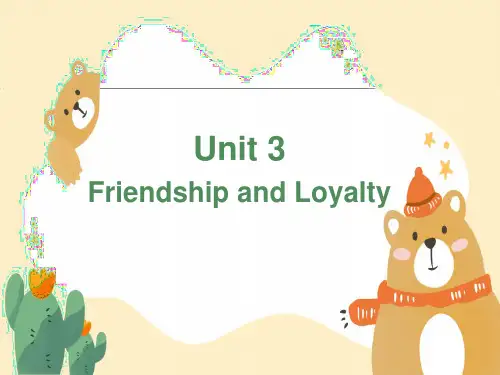
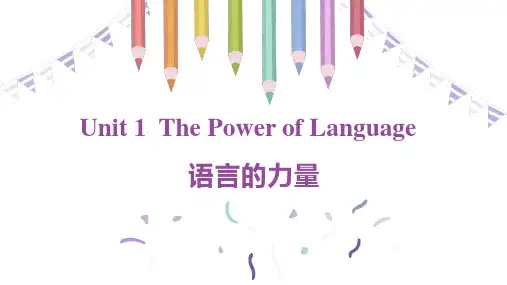
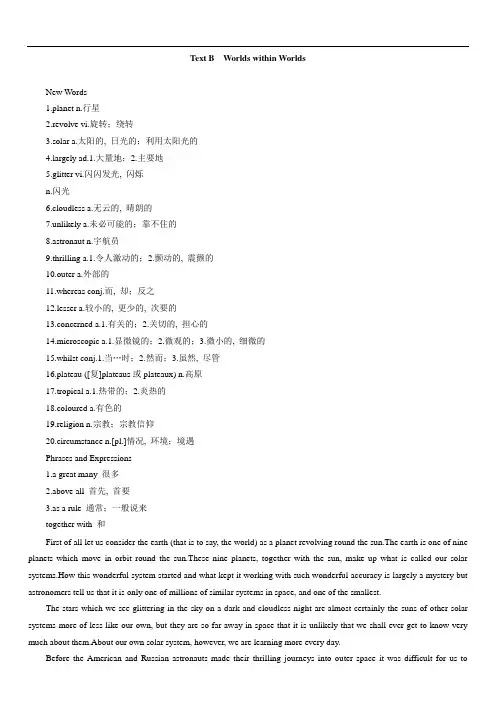
Text B Worlds within WorldsNew Words1.planet n.行星2.revolve vi.旋转;绕转3.solar a.太阳的, 日光的;利用太阳光的rgely ad.1.大量地;2.主要地5.glitter vi.闪闪发光, 闪烁n.闪光6.cloudless a.无云的, 晴朗的7.unlikely a.未必可能的;靠不住的8.astronaut n.宇航员9.thrilling a.1.令人激动的;2.颤动的, 震颤的10.outer a.外部的11.whereas conj.而, 却;反之12.lesser a.较小的, 更少的, 次要的13.concerned a.1.有关的;2.关切的, 担心的14.microscopic a.1.显微镜的;2.微观的;3.微小的, 细微的15.whilst conj.1.当…时;2.然而;3.虽然, 尽管16.plateau ([复]plateaus或plateaux) n.高原17.tropical a.1.热带的;2.炎热的18.coloured a.有色的19.religion n.宗教;宗教信仰20.circumstance n.[pl.]情况, 环境;境遇Phrases and Expressions1.a great many 很多2.above all 首先, 首要3.as a rule 通常;一般说来together with 和First of all let us consider the earth (that is to say, the world) as a planet revolving round the sun.The earth is one of nine planets which move in orbit round the sun.These nine planets, together with the sun, make up what is called our solar systems.How this wonderful system started and what kept it working with such wonderful accuracy is largely a mystery but astronomers tell us that it is only one of millions of similar systems in space, and one of the smallest.The stars which we see glittering in the sky on a dark and cloudless night are almost certainly the suns of other solar systems more of less like our own, but they are so far away in space that it is unlikely that we shall ever get to know very much about them.About our own solar system, however, we are learning more every day.Before the American and Russian astronauts made their thrilling journeys into outer space it was difficult for us torealize what our earth looked like from hundreds of thousands of miles away, but the photographs which the astronauts were able to take show us the earth in space looking not very different from what the moon looks like when we look at it from the earth.The earth is, however, very different from the moon, which the American astronauts have found to be without life or vegetation, whereas our earth is very much alive in every respect.The moon, by the way, is called a satellite because it goes round our earth as well as round the sun.In our words, it goes round the sun with our earth.The surface of our earth is covered by masses of land and larger areas of water.Let us consider the water areas first.The total water area is about three times as large as the land area.The very large separate areas of water are called "oceans" and the lesser areas are called "seas."In most of the oceans and seas some of the water is found to be flowing in a particular direction ―that is to say, from one part towards another part of the ocean or sea concerned.The water which is flowing in this manner is said to be moving as a "current." There are many thousands of currents in the waters of the oceans and seas, but only certain of the stronger and better marked currents are specially named and of great importance.There currents are important because they affect the climate of the land areas close to where they flow and also because they carry large quantities of microscopic animal and vegetable life which forms a large part of the food for fishes.The nature and characteristics of the surface of the land areas of the earth vary a great deal from area to area and from place to place.The surface of some areas consists largely of high mountains and deep valleys whilst, in other areas, most of the surface consists of plains.If one made a journey over the Continents one world find every kind of surface including mountain ranges, plains, plateaux, deserts, tropical forestlands and empty areas covered permanently by ice and snow.When thinking and learning about the world we should not forget that our world is the home of a vary great many different people ―peoples with different coloured skins, living very different lives and having very different ideas about a great many important things such as religion, government, education and social behaviour.The circumstances under which different people live make a great difference between the way in which they live and the way in which we live, and it ought to be our business to try to understand those different circumstances so that we can better understand people of other lands.Above all, we should avoid deciding what we think about people different from ourselves without first having learned a great deal about them and the kind of lives they have to live.It is true to say that the more we learn about other people , the better we understand their ideas and, as a rule, the better we like those people themselves.词汇讲解:1.revolve v.旋转, 绕转The earth revolves round / around the sun.地球绕着太阳转。
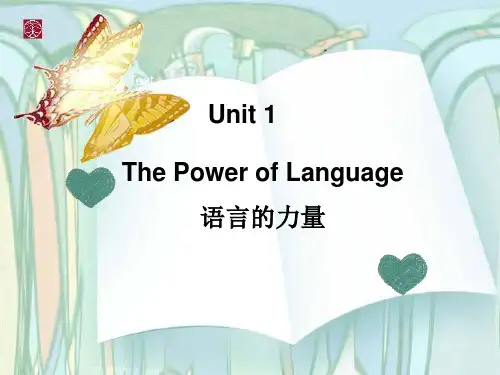
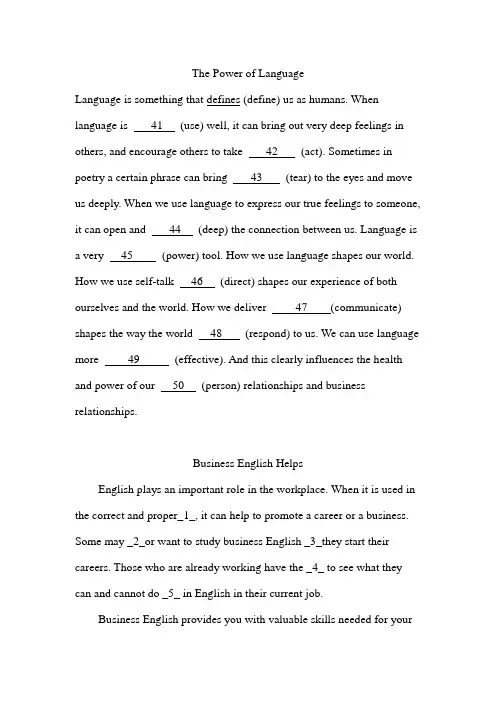
The Power of LanguageLanguage is something that defines (define) us as humans. When language is 41 (use) well, it can bring out very deep feelings in others, and encourage others to take 42 (act). Sometimes in poetry a certain phrase can bring 43 (tear) to the eyes and move us deeply. When we use language to express our true feelings to someone, it can open and 44 (deep) the connection between us. Language is a very 45 (power) tool. How we use language shapes our world. How we use self-talk 46 (direct) shapes our experience of both ourselves and the world. How we deliver 47 (communicate) shapes the way the world 48 (respond) to us. We can use language more 49 (effective). And this clearly influences the health and power of our 50 (person) relationships and business relationships.Business English HelpsEnglish plays an important role in the workplace. When it is used in the correct and proper_1_, it can help to promote a career or a business. Some may _2_or want to study business English _3_they start their careers. Those who are already working have the _4_ to see what they can and cannot do _5_ in English in their current job.Business English provides you with valuable skills needed for yourwork. For example, you will learn _6 _ to negotiate. Being able to deal with a_7_and knowing how to bargain and _8_ an agreement can make a _9_difference to the outcome.Business English learning encourages professional and efficient communication, and promotes service to customers and business partners, _10_ is a great advantage for any business.Spilt (打翻的) MilkI recently heard a story about a famous scientist who had made several very important medical achievements. He was asked why he was so much more creative than the average person.He responded that it all came from an experience when he was about two. He had been trying to remove a bottle of milk from the refrigerator when he lost his grip (紧握) and it fell, spilling (打翻) the milk all over the floor.When his mother came into the kitchen, instead of yelling at him, or punishing him, she said, "Robert, what a wonderful mess you have made! Well, the damage has already been done. Would you like to play in the milk for a few minutes before we clean it up?"Indeed, he did. After a few minutes, his mother said, "Robert, whenever you make a mess like this, eventually you have to clean it up. So, how would you like to do that? We could use a sponge (海绵) or a towel. Which do you prefer?" He chose the sponge and together they cleaned up the spilt milk.His mother then said, "You know, what we have here is a failed experiment in how to effectively carry a big milk bottle with two tiny hands. Let's go out in the back yard and fill the bottle with water and see if you can discover a way to carry it without dropping it." The little boy learned that if he grasped the bottle at the top near the lip with both hands, he could carry it without dropping it.The scientist remarked that it was then that he knew he didn't need to be afraid to make mistakes. Instead, mistakes were just opportunities for learning something new, which is, after all, what scientific experiments are all about. Even if the experiment "doesn't work," we usually learn something valuable from it.1. This story is about a scientist who ( )A. was smarter than the average personB. achieved great success in the medical fieldC. was extraordinary when he was youngD. became well-known after an interview2. He got the milk spilt all over the kitchen floor because he ( )A. slipped and fellB. was weakC. dropped the bottleD. was naughty3. After seeing the spilt milk, his mother ( )A. encouraged him to play in the milkB. forced him to clean the kitchenC. shouted at himD. cleaned the floor herself4. The mother and the son went out in the back yard to ( )A. find a way to carry the bottleB. search for a new bottleC. fill the bottle with milkD. clean the bottle5. According to the text, mistakes give us chances to ( )A. do some experimentsB. teach a child a lessonC. know the truthD. learn something newLearning From MistakesLots of people dare not make mistakes (mistake). They fear they will be laughed at or 1 (blame)by others. They fear they will lose their money and 2 (belonging) or be under heavy stress. But risks are 3 (possible) to avoid and they do pave the way towards success. Have you ever 4 (hear) of anyone who achieves success without making any mistakes?So it is only 5 (nature) that making mistakes should be considered amust. You shouldn't worry about that as you 6 (probable) get lots of advantages out of your mistakes. By making mistakes, you can at least distinguish between the correct and the 7 (correct) parts of what you did. Robert Stevenson once s aid:“Our business in life is not to be 8 (success), but to continue to fail in good spirits”You needn't worry about anything as long as you keep on going by 9 (wise) learning from your mistakes and 10 (try) even harder.Positive Attitude towards FailureI clearly remember a period during which I felt like a failure. But what I (1) ___ learned was that failing at one thing is not failing at all things. And, in fact, failure is a (2) ____ part of growth. Life is filled with trial and (3) ____. In order to walk the path to (4) ____, you need to make some (5) ____ turns along the way. What I learned was to "fail forward", to (6) ____ each mistake to make myself better. One of the (7) ____ problems people have with failure is that they are too quick to judge isolated (8) ___ in their lives and label them as failures. (9) ___, they need to keep the bigger picture in mind. A successful baseball player doesn't (10) ____ at a mistake he makes and think of failure. He sees it within the context of the bigger picture.Failing ForwardThere are several key abilities that allow successful people to fail forward instead of taking each setback personally. First, successful people don't blame themselves when they fail. They take 1 for each setback, but they don't take the failure personally. Second, successful people don't 2 themselves by individual failures. They 3 that each setback is a small 4 of the whole. Third achievers are 5 to vary their approaches to problems. That's important in every walk of life. If one 6 doesn't work for you, if it brings repeated failures, 7 try something else. To fail forward you must do what works for you, not 8 what works for other people. Finally, successful people are 9 . They don't let one error keep them down. They learn from their mistakes and 10 on.Loyalty found in a friends akin to making a deposit in a bank account. More often than not, your deposits 1 interest, an interest in your well-being and welfare. A loyal friend attracts another loyal friend.In essence, water does seek its own level.If you were a B.L.F. way before Facebook gained notoriety, 2 I'm sure you understand the premise of loyalty in a friend. You should never 3 your B.L.F. to gain more friend so make yourself seem more 4 to others. These are not the traits of a best loyal friends.A best loyal friend does not care who is invited to your party. They will 5 your party and celebrate you, just in the way a best loyal friend should do.Reconnecting with a best loyal friend is 6 to do on the pages of Facebook. 7 , a virtual friend does not assure you of his loyalty. My 8 to you is that you'd better pay 9 to the smiling faces on the Facebook pages. In the eighties we were warned of smiling faces in a song, which contained these lyrics,"A smile is just a frown turned upside down, my friend."Now, that is the undisputed 10 for my generation.Choosing FriendsIn our daily life, it's nice to have friends. While family is 1 important,friends are a different support system of your choosing. As the 2 goes,"You can't choose your family, but you can choose your friends. “Choosing them wisely can 3 your life more exciting and inspiring.Deciding whom you choose as your friends says as much about youas it does them. You may choose your friends 4 on similar interests. You may choose them because you're opposites of each other and find this interesting.Often,friends become"friends"because they are naturally attracted towards each other due to 5 personalities. Sometimes it's just circumstances that bring two individuals together who then become friends.Whatever prompts a friendship, developing one is a very 6 experience.This is especially true when, before you know it, a certain 7 turns into a unique lifelong close friendship. Again, it's been said that a person 8 has only a couple of very close friends in their life. Think of whom you 9 as truly close friends. These are those few individuals you can 10 and share deep thoughts and concerns with.Keeping Friendship AliveIt’s so easy to take good friends (friend) for granted. Like a 1 (comfort) pair of gloves, old friends wear well. But friendships that suffer from busyness and 2 (familiar) can’t afford to be neglected too long. They need to be 3 (renew). If you want and need to keep true friendship alive and 4 (health), please consider and think over a list of the most important qualities. 5 (Probable) itwill help you to understand why you and your best friend haven't 6 (call) up for ages, why you’re getting embarrassed while 7 (be) asked “Whom are yo u 8 (go) to have fun with this weekend?" You may neglect your intimate friends from time to time, but if you fail to cultivate these 9 (virtue)---loyalty, forgiveness, dedication (奉献) and 10 (honest)---you can't expect to keep true friends.Be GratefulWhether you are a waiter (wait) or a doctor, your job is about serving others and making their life better. We have all (1 )_____(have) experiences where someone (2 )______ (work) in their job has lifted us up and made a (3 )________(different) to our day or brought us down and made our day worse. We have all met (4 )______ (real) wonderful people cleaning floors. We have also met people who are not so wonderful but have (5 )_______ (amaze) jobs. So whatever you do, be grateful. This doesn't mean you have to stay in a job you don't like, but it (6 )_______(help) you develop a more positive attitude. You may not like your job, but you can enjoy being with your (7 )________(colleague). This is something to be (8 )_______ (thank) for. When you practise (9 )___________(grateful), it allows you to develop a more useful outlook and be (10 )________(happy) at your work.。
自考英语二教材课文讲义u n i t文档编制序号:[KK8UY-LL9IO69-TTO6M3-MTOL89-FTT688]Unit 1 The Power of Language?I. New words and expressions New words1. critical adj. 有判断力的;判断公正(或审慎)的2. non-fiction n. 纪实文学3. position n. 观点;态度;立场4. statement n. 说明;说法;表态5.?question?v. 表示疑问;怀疑out of question / out of the question6. evaluate v. 估计;评价;评估7. context n. 事情发生的背景,环境,来龙去脉8.?value?n. values [pl.]是非标准;价值观valuableinvaluable=pricelessvalueless9. represent?v. 描述;表现representative adj./n.10. assertion n. 明确肯定;断言11. sufficient?adj.?足够的;充足的sufficiencyinsufficient12. statistic n. statistics [pl.]统计数字;统计资料13. integrate v.(使)合并,成为一体14. authority?n.专家;学术权威;泰斗an/the authority on sth.authorize15. compare?v. 比较;对比compare A with Bcompare A to B16. subject n. 主题;题目;题材17. consistent adj. 相符的;符合的18. inconsistency n. 不一致19. assumption n. 假定;假设20. case?n. 具体情况;事例in casein case of firein case that…a case in pointconfirmed/suspected cases21. directly adv. 直接地;径直地22. identify v. 找到;发现23. valid?adj. 符合逻辑的;合理的;确凿的validity n. 有效性,正确(性)invalid24. credible?adj. 可信的;可靠的incredible=unbelievable25. landmark n.(标志重要阶段的)里程碑26. relevant?adj. 紧密相关的;切题的relevancy n. 关联;恰当irrelevant27. current adj. 现时发生的;当前的28. appropriate?adj. 合适的;恰当的inappropriateIt's (not) appropriate that ….29. bias n. 偏见;偏心;偏向30. considerably?adv. 非常;很;相当多地considerconsideringconsiderableconsiderateconsideration31. Democrat n. (美国)民主党党员,民主党支持者民32. Republican n. (美国)共和党党员,共和党支持者33. reflect v. 显示;表明;表达34. informed?adj. 有学问的;有见识的well-informedill-informedPhrases and Expressions1. apply to 使用;应用2. put forth 提出;产生3. take … into account 考虑到;顾及4. accept/take … at face value 相信表面;信以为真5. with a grain of salt 有保留地;持怀疑态度地II. Text LearningCritical Reading①?(1)Critical reading?applies to?non-fiction writing?in which?the author?puts forth a position?or seeks to make a statement.?Critical reading is active reading. It involves more than just(不只是,不仅仅是) understanding what an author is saying. Critical reading involves questioning and evaluating what the author is saying, and forming your own opinions about what the author is saying.?Here are the things you should do to be a critical reader.(启下句)本部分重点及难点:1. Critical reading?applies to?non-fiction writing?in which?the author?puts forth a position?or seeks to make a statement. apply to sb./sth.= be applicable to sb./sth.apply的派生词:application, applicant, applicable②?Consider the context of what is written. You may be reading something that was written by an author from a different cultural context?than?yours.?(2)Or, you may be reading something written?some time?ago in a different time context than yours.?(3)In either case, you must recognize and take into account any differences between your values and attitudes and those represented by the author.?本部分重点及难点:2. Or, you may be reading something written?some time?ago in a different time context than yours.some time注意区分:sometime / sometimes / some times3.?In either case, you must recognize and?take into account?any differences between your?values andattitudes?and?those?represented by the author. 不论哪种情况,你必须注意并考虑你的价值观和态度与作者所述的价值观和态度有何不同。